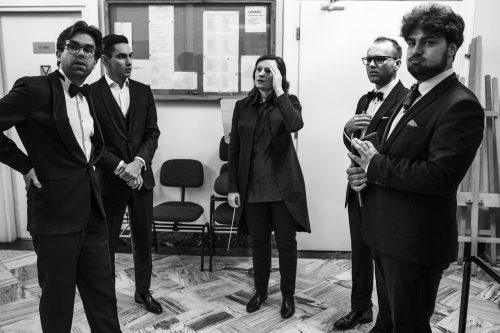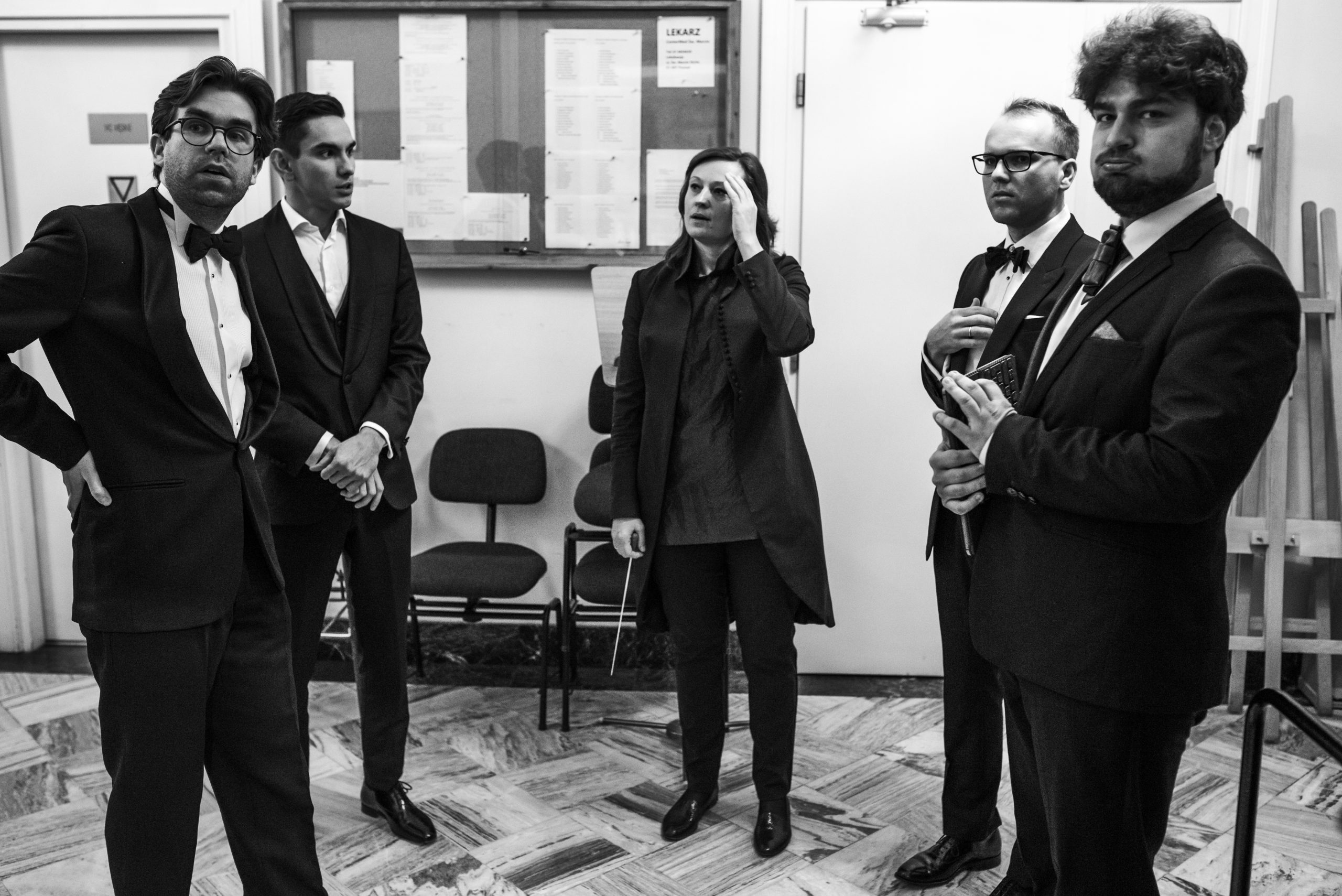 Poland 4 x Bach: Keyboard Concertos. Dmitri Shishkin, Marek Bracha, Lukas Geniušas, Pawel Wakarecy (pianos); Amadeus Chamber Orchestra of Polish Radio / Anna Duczmal-Mróz (conductor). Adam Mickiewicz Institute University Hall, Poznań, Poland, 17.11.2019. (CC)
Poland 4 x Bach: Keyboard Concertos. Dmitri Shishkin, Marek Bracha, Lukas Geniušas, Pawel Wakarecy (pianos); Amadeus Chamber Orchestra of Polish Radio / Anna Duczmal-Mróz (conductor). Adam Mickiewicz Institute University Hall, Poznań, Poland, 17.11.2019. (CC)

J S Bach – Keyboard Concerto in F minor, BWV 1056 (1738); Concerto for Two Keyboards in C minor, BWV 1062 (1739); Concerto for Three Keyboards in C, BWV 1064; Concerto for Four Keyboards in A minor, BWV 1065 (1730?)
The beautiful, clean and calm city of Poznań was the setting for this meeting of previous Chopin Competition laureates, ahead of the XVIII Competition (October 2-23, 2020). The immaculate Adam Mickiewicz Institute University Hall is a similarly impressive space, the acoustic generous. The four soloists have all been participants in the famous Chopin Competition: Shishkin won sixth prize in the XVII competition, Wakarecy was awarded a Distinction Award in the XVI competition, Geniušas was placed second in 2010 (XVI), in which Bracha also competed.
The universality of Bach shone through – somehow the purity of his expression seemed perfect for the occasion, although one has to acknowledge the convenience of the concertos for multiple keyboards in his output for present purposes. The solo keyboard concerto chosen was the F minor, BWV 1056, its first movement robust (the tempo given as ‘Allegro’ in the programme, but Bach’s manuscript seems not to specify). Dmitri Shishkin was an eloquent soloist, finding his stride fully in the expressive central Largo. Shishkin has a lovely sound, his right-hand cantabile against pizzicato strings at one point a real highlight. The finale had plenty of life, and if again it battled against the roomy acoustic, Shishkin’s articulation was perfectly judged (wonderfully even right-hand trills as well). The orchestra was fully attentive, as they were throughout the evening, Duczmal-Mróz’ expressive but impeccably clear beat a continual Godsend for ensemble.
The Concerto for Two Keyboards, BWV 1962 is based on the Double Violin Concerto in D minor. The powerful combination of Pawel Wakarecy and Lukas Geniušas provided a memorable reading. Interesting – and eminently laudable – that both pianists were pretty much immobile, letting their fingers do the talking. Wakarecy used perhaps a little more sustaining pedal, but always intelligently. Really, this performance took the evening to another level, the profound stillness of the central Andante e piano the perfect foil for the contrapuntal exuberance of the finale, which here buzzed with energy. A sense of counterpoint as a blossoming of life itself seemed palpable here.
If this concert is anything to go by, Polish concerts run to time in a way that UK ones do not: the interval was the duration it claimed to be; start times were honoured. There is a definite sense of civility and calm to the whole experience.
Continuing the incremental nature of the evening, it was the Concerto for Three Keyboards up next (BWV 1064, date uncertain, 1735-45?) that began the second part, Wakarecy, Shishkin and now Pavel Bracha together in a performance of much confidence and sophistication. The opening Allegro was bright and festive, beautifully balanced between the three instruments (the three Steinways, too, beautifully prepared and matched). If I was forced to single out a pianist, it would probably be Wakarecy for his pinpoint articulation. How lovely to see Duczmal-Mróz stop the inter-movement applause in its tracks with a cut-off gesture – the music begged for silence before the Adagio. The concentration of the subsequent Adagio seemed even deeper in response, its exquisite sense of stasis and even desolation potent in the extreme; in response, perhaps, the sharing of motifs in the finale seemed urgent, the energy between the soloists near-palpable.
The four-keyboard concerto is of course an arrangement of Vivaldi’s Concerto for Four Violins, Op. 3/10 (RV 580). Like the original, it is full of vitality. The players’ order here was Shishkin, Wakarecy, Geniušas, Bracha. Freshness seemed to define this performance, from the exuberance of the opening Allegro to the vital drama of the central Largo, where chords were raw, and where certain repetitions of motifs took on an almost Philip Glass-like demeanour, a remarkable effect. Shishkin might be singled out in the finale for the excellence of his contribution – there was perhaps the feeling he was happier in company.
Anna Duczmal-Mróz is a fabulous accompanist, attentive to her soloists and heading an orchestra that obviously loves her. There is an interesting, possibly unique, lineage here: her mother, Agnieszka Duczmal, is not only also a conductor, but it was Agnieszka who actually founded the Amadeus Chamber Orchestra, which her daughter now leads. Transparency was aided by the distribution of parts: 7:6:4:3:1, the progressive lessening of numbers down onto a single double-bassist (Damian Sobkowiak) enabling the orchestral clarity that so characterised the evening.
A rare opportunity to hear Bach concertos for keyboards (plural) in one evening, then, impeccably programmed and superbly, thought-provokingly delivered. Each of the four soloists is testament to the soundness of the Chopin Competition’s decisions, and each deserves every success.
Colin Clarke
